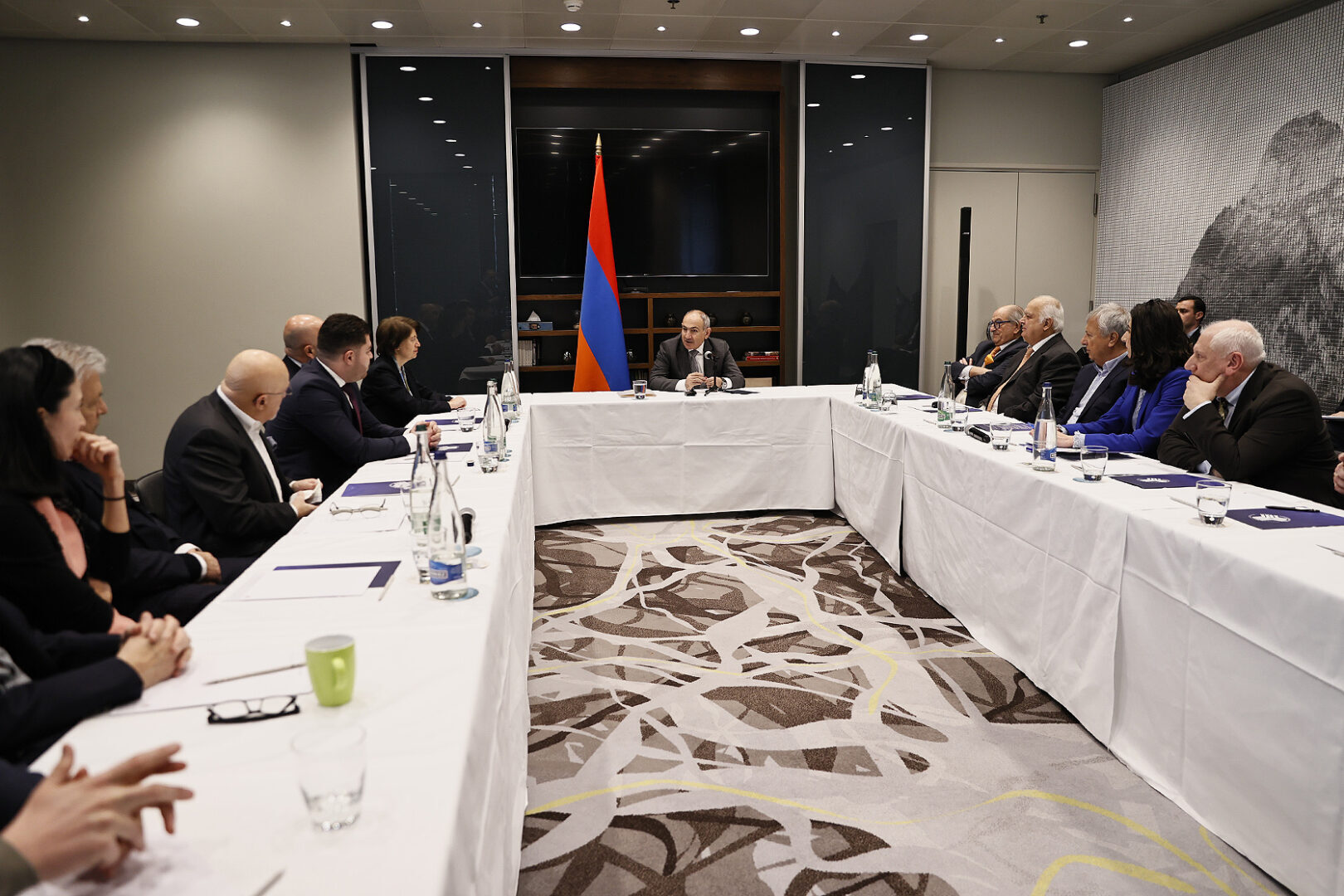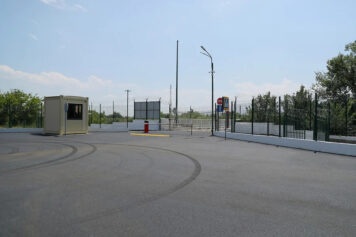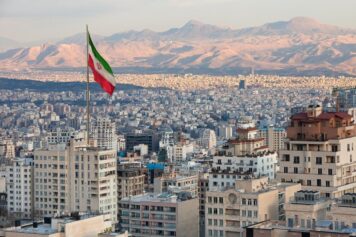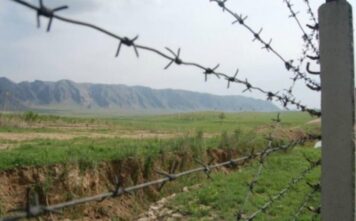What Game Is Being Played and Who Is Playing That? The Denial of Genocide and Historical Revisionism, and the Destruction of National Identity
02.02
2025
During a meeting in Zurich, Switzerland, with business representatives of the Armenian community, Nikol Pashinyan, who is in the driving seat of Armenia, made statements regarding the Armenian Genocide that are entirely anti-scientific, manipulative and false, align with the ideological approaches of the ruling regime in Armenia, and go against the national-state interests of Armenia and the Armenian people, as well as the foundational pillars of collective identity. The meeting took place in the city where in 2006, the infamous Turkish denialist and nationalist Doğu Perinçek was sentenced to imprisonment and fined for denying the Armenian Genocide and promoting its denial.
At first glance, the remarks may seem ordinary, cloaked in the guise of science, but they are, in fact, extremely dangerous statements, through which the head of the present authorities lead us into a high-risk place, the consequences of which will be felt later. Pashinyan is not short-sighted to openly deny a historical fact; rather, these anti-scientific and populist thoughts are directed at those segments of the domestic and foreign audience from whom he expects support to ensure the longevity of his power.
No distinguished social psychologist has yet been able to present a complete picture of the Armenian Genocide and, in general, the issue of genocides. No historian or political scientist has been capable of conducting such an in-depth and comprehensive study on overcoming the psychological consequences of Genocide or the Holocaust, which would be pivotal in seeking and applying solutions to this complex and multilayered issue. Pashinyan’s statement is a trap aimed at burying the question of the legal-political consequences of the Armenian Genocide, concealing the issue of Armenian identity under the guise of everyday concerns, and packaging it in a false thesis of living in peace and harmony. Below, I will attempt to decode Pashinyan’s formulations and analyze the layers.
The Issue of Historical Perception: Nikol Pashinyan claims that “we have left the perception of history to chance.” This is a scientifically incorrect thesis, as the study of the Armenian Genocide has been a consistent process both academically and politically. Hundreds of Armenian and foreign historians, public intellectuals, psychologists, and lawyers have worked for over a century not only to document the historical truth but also to include it in international legal provisions. Let us bring a specific fact: The study of the Armenian Genocide has shaped the foundations of Genocide Studies of the 20th century. Raphael Lemkin coined the term genocide based on the Armenian Genocide.
The Psychology of the Genocide Survivor: Pashinyan raises a question as to “what it means to be a people that has survived genocide?” From a scientific perspective, peoples who have survived genocide have adopted three main paths:
The path of restoring justice: For example, in the case of the Jews, recognition of the Holocaust, holding Germany accountable, and international legal processes.
The path of preserving historical memory: Archives, memorials, educational programs that defend the truth.
The path of strengthening state security: A significant lesson for peoples who have survived genocide is ensuring state protection, as seen in Armenia before 2018 and Israel, where strengthening state security is one of the key foundations of official policy.
In the case of the Republic of Armenia, only the second and third approaches—preserving historical memory and strengthening state security—have been partially implemented, while the first has not become part of a systematic policy.
3. Genocide as a force and driving force: Pashinyan seems to be trying to demonstrate a constructive approach, while in reality, the formulation is evasive. If the experience of genocide survivors is to become a “force and driving force”, what specific mechanisms are being proposed?
Should the international legal consequences of the Armenian Genocide be pursued?
Should the recognition of Genocide be linked to the security of Armenia?
How should this awareness be transformed into state strategy?
Let’s further explain this through the example of the Holocaust: Israel has turned it into a national security doctrine, which has contributed to a strong army, an intelligence system, and a proactive foreign policy. In the case of Armenia, such a doctrine does not exist. During the years of the ruling Civil Contract party, Armenia lost the state’s security appeal, squandered resources, lost a war, and ceded territories that are strategically and vitally significant for the continuity of the Armenian state. Therefore, “turning the experience of genocide into power” implies a clear strategy that must involve all intellectual strata of the Armenian nation, especially the Diaspora. A strategy, not scientifically bankrupt ideas aimed at pleasing the Turkish audience and clinging to power for one more day. Personally, my political position is as follows: the Armenian Genocide should be perceived not only as a painful past but also as a factor shaping national security and the international agenda, which should become a lever for the protection of state interests.
What does national identity management mean, and is it manageable, or is it the result of internal and external influences? The question is particularly relevant—especially in the context of migration processes in a globalizing world—but to answer such questions, it is necessary to have long-term experience in science, theoretical knowledge, and scientific methodology for analysis and research. National identity relates to the relationships between the state, society, and its citizens, as well as the native language, culture, history, values, moral perceptions, beliefs, and national traditions. In the matter of the Armenian Genocide, the management of Armenian identity should aim not only to preserve the national dignity of the Republic of Armenia and its citizens but also of the entire Armenian nation worldwide. Moreover, preserving dignity does not mean sitting idly by, talking about the pain and grief that has befallen the Armenian people, but rather ensuring nationwide involvement, making the recognition process participatory and inclusive, engaging all layers of the nation.
What does Pashinyan propose instead? He says the Armenian people should reconsider their behavior and attitude toward other nations, inadvertently pushing away the imperative for Turkey—the organizer, coordinator, executor, and primary responsible party for the Genocide—to accept its complicity and legal-political consequences, while blaming the Armenian people for adopting a non-constructive position and living with anti-Turkish theses. Clearly, such an approach will create the impression among the international community that Armenians and the Republic of Armenia are allegedly “advocates of a false and fabricated history,” and thus, the issue should be removed from the agenda.
The consequence of Pashinyan’s shortsighted (likely calculated and systematic) statement will be that a revision of that catastrophic period in Armenian history is necessary for Armenians to prove that they are not to blame for the genocide. Furthermore, according to Pashinyan, the Armenian people must affirm the aspects of their identity that are more important to them. This means that Armenians must change their attitude toward the state of Turkey and the Turkish people in order to live and coexist peacefully.
I will not reinvent the wheel if I say that the Armenian people do not have a problem with the Turkish people, but with the Turkish state’s denialist state machinery, which dates back even before 1915. We are not naive, nor are we brainless, to not understand that we must be prepared for changes, considering globalization, cultural diversity, and our geographical position, but these changes cannot come at the expense of security and the denial of history. Before talking about identity, it would be good for the leader of the ruling regime to look at the ruined educational system of his own country, the lost democracy, the unclear prospects for development, the crushed national dignity, the security challenges of the state, and most dangerously, the attempts to revise history.
The genocide cannot be viewed as power “without pain.” The memory and history of the people who survived the genocide cannot be processed as a source of driving force. The issue of the genocide is not a diplomatic tool to attempt to make concessions; this issue is not just a survivor’s history, but a profound issue of justice. We cannot allow the issue of genocide to be used as a “force” without historical assessment and the elimination of consequences. If Pashinyan means that the issue of genocide can be turned into a political tool to secure dividends for the continuity of power, then, to put it mildly, he is mistaken. The genocide is a matter of national memory and a demand; it is not just history that should be revised for some selfish purposes.The Genocide is a matter of protecting the rights of the Armenian people, and its recognition cannot be subject to any political concessions or reworking for the sake of establishing diplomatic relations with Ankara or Baku. The recognition of the genocide is a tool of international justice, not merely a monument of pain or a revisable topic. The proponents of such an approach are the leaders of Turkey, Azerbaijan, and Armenia, who want to push the issue of genocide into the realm of historical revisionism, that is, into the province of revising, rewriting, or editing history, which is equivalent to a crime. By doing so, Pashinyan directly undermines Armenia’s negotiating position because if we assume for a moment that the international community—which has spared no effort for over 100 years, has served all its intellectual potential to seriously study and substantiate the full responsibility of the Turkish organization and complicity in the Armenian Genocide—takes note of this, then the issue of genocide recognition will no longer be on Armenia’s and the international community’s agenda. Relations with the Diaspora will also be destroyed. Let us not forget that the issue of Genocide recognition is one of the components of the Armenian Diaspora’s identity.
What consequences can the manipulation of the genocide issue have on the relationships between the state, its citizens, and the international community, and how will it affect the preservation or destruction of national identity, as well as the activation or shut-off of the ideological and institutional tools regarding the continuity of the genocide?
The existence of the state, its survival (even nominally), the effectiveness of institutional operations, and the differentiation of territorial integrity and sovereignty are still insufficient to assert that the challenges to national identity have been overcome or, at a minimum, neutralized.
When the issue of genocide becomes a tool for political manipulation, it is often presented not as a necessity for the true understanding of national history, but as a means of political manipulation. This can lead to the distortion of the historical identity of the people, while national consciousness may be narrowed down to the image of a “victim,” weakening the collective self-confidence of the nation.
When the issue of genocide is “used” as a means of internal political struggle or as a tool for political pressure/manipulation in foreign relations, it can create a false impression in the international community that it is not a matter of historical justice, but a temporary political strategy. This can undermine the perception of the phenomenon of genocide and the process of international recognition, weakening the moral and legal foundations for addressing its consequences.
Manipulations weaken public interest and vigilance; people become fatigued by the exploitation of the topic, gradually losing interest in their own history and questioning it. This leads to the denial or rejection of historical memory as a topic that has already been exhausted, which is dangerous for the continuity of national identity.
Therefore, why is the present prime minister of Armenia “aggravating” this issue and, instead of fulfilling his constitutional and legal obligations aimed at neutralizing the security challenges facing the Republic of Armenia, putting the issue of reviewing the Armenian Genocide on the agenda?
Techniques to buy time: Turkey has consistently insisted that Armenia should leverage its pressure tactics to compel the Armenian diaspora to abandon political struggles and demands for recognition, in exchange for the establishment of diplomatic relations between Armenia and Turkey. This would of course be followed by Yerevan’s commitment to the ratification of the Moscow and Kars treaties. Pashinyan is now giving exactly that message, paving the way for further concessions.
An attempt to strengthen positions within Armenia: Pashinyan presumably calculates that his main electorate—the unrealistic “peace advocates”—will accept this approach as part of the “new Armenia” trend.
The issue at hand is no longer the denial of genocide but rather its complete removal from the international agenda, which could be more dangerous in the long term. The prerequisites were signaled when the expression “national pain” was used instead of the term “genocide”— this being primarily directed at an external audience. If one does not use appropriate legal terminology, it implies a “whitewashing” of reality, indirectly justifying it. When Pashinyan states that “genocide should be seen not just as national grief,” he attempts to present it as a “memory” from the past rather than a specific historical fact that must be recognized and condemned. This statement could serve as a basis for future claims that “the issue of the Armenian Genocide has been resolved.”
In discussing the issue of putting the Armenian Genocide on the international agenda, Pashinyan distorts the actual facts and history surrounding the issue, attributing it to the conditions of the 1930s and 1940s, favorable for international community. He views the internationalization of the issue in an anti-Soviet context, crediting these successes not to the simultaneous nationwide protests within the diaspora and Soviet Armenia—such as the movements in Uruguay, South American countries, the organized campaign for recognition, and the construction of the Armenian Genocide Memorial in Yerevan—but rather suggesting that these were merely a response to the circumstances of the time and a gesture from the international community toward Armenians, that international relations and geopolitical realities also influenced the process of the recognition. The latter cannot be denied, but if in the near future the influence of international politics on this issue weakens and the world confronts us with the fact that morals and times have changed and there is no time to deal with this issue, what position will the Republic of Armenia and the Armenian people have on this issue? In this way, Pashinyan wants to curry favor with Turkey, offering to postpone recognition, while simultaneously reducing the legal and political weight of the claim.
While, I propose establishing relations with Turkey without renouncing the issue of genocide. This is the greatest dilemma that our foreign policy has faced for a long time. Contrary to the fact that all Armenian governments, except for the current ruling party, have acted under the principle that “relations with Turkey should be established without preconditions.”
First, it must be declared to the whole world that the recognition of the Armenian Genocide does not only concern Armenia and Turkey, but the international community as well, that this is a matter of human rights and justice, not merely an issue of establishing inter-state relations. Thus, we can conclude that the international community can also be involved in the process of reconciliation between Armenia and Turkey as a concerned party, affirming its commitment to the restoration of human rights and justice.
The opening of borders between Armenia and Turkey will allow for a dialogue between peoples and an unrestrained discussion of painful issues from the past.
It should be noted that the Armenia-Turkey negotiations are not just bilateral relations, but a partnership built in an international context. This means that Yerevan and Ankara are not negotiating over the Genocide issue, or that this issue hinders bilateral relations, but that the Armenia-Turkey negotiations are aligned with the principles of international justice and human rights.
We have no complexes, as the ruling party tries to position us. We have no complexes and are ready to shake hands with Turkey without compromising the value-based foundation of our national identity and universal human rights. Historical justice is a fundamental principle, and in this process, we should not overlook the interests of global actors; otherwise, we will become, as they say in Latin, terra nullius, meaning “nobody’s land”.





